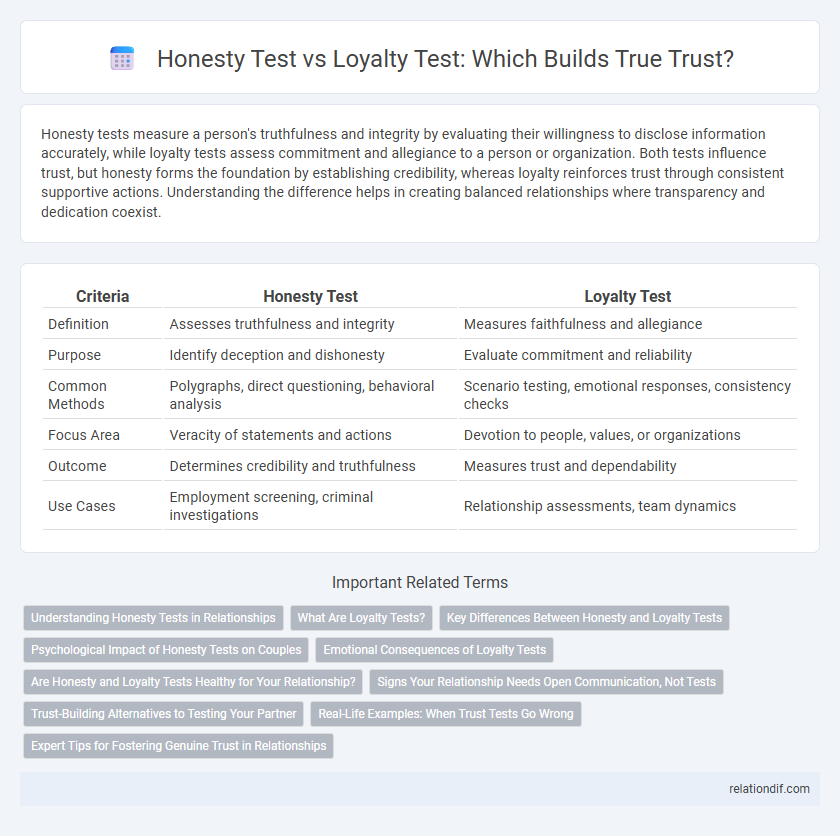Honesty tests measure a person's truthfulness and integrity by evaluating their willingness to disclose information accurately, while loyalty tests assess commitment and allegiance to a person or organization. Both tests influence trust, but honesty forms the foundation by establishing credibility, whereas loyalty reinforces trust through consistent supportive actions. Understanding the difference helps in creating balanced relationships where transparency and dedication coexist.
Table of Comparison
| Criteria | Honesty Test | Loyalty Test |
|---|---|---|
| Definition | Assesses truthfulness and integrity | Measures faithfulness and allegiance |
| Purpose | Identify deception and dishonesty | Evaluate commitment and reliability |
| Common Methods | Polygraphs, direct questioning, behavioral analysis | Scenario testing, emotional responses, consistency checks |
| Focus Area | Veracity of statements and actions | Devotion to people, values, or organizations |
| Outcome | Determines credibility and truthfulness | Measures trust and dependability |
| Use Cases | Employment screening, criminal investigations | Relationship assessments, team dynamics |
Understanding Honesty Tests in Relationships
Honesty tests in relationships assess transparency and truthfulness by evaluating how partners communicate feelings and disclose important information. Unlike loyalty tests, which measure faithfulness and commitment, honesty tests focus specifically on the accuracy and openness of shared information. Understanding honesty tests helps build a foundation of trust where both partners feel safe expressing themselves without fear of deceit.
What Are Loyalty Tests?
Loyalty tests are assessments designed to evaluate an individual's faithfulness and commitment to a person, group, or organization, often by observing reactions to specific scenarios or temptations. Unlike honesty tests that measure truthfulness and integrity in communication, loyalty tests focus on emotional allegiance and the willingness to support despite challenges. These tests can reveal deep insights into trustworthiness within personal relationships or workplace environments by highlighting consistent dedication over time.
Key Differences Between Honesty and Loyalty Tests
Honesty tests evaluate truthfulness by assessing an individual's tendency to be truthful and avoid deceit, typically through direct questioning or behavioral analysis. Loyalty tests measure commitment and allegiance to a person, organization, or cause, often by observing reactions to potential betrayal scenarios or evaluating confidential information handling. The key difference lies in honesty tests focusing on factual truth-telling, while loyalty tests concentrate on devotion and prioritizing group interests over personal benefit.
Psychological Impact of Honesty Tests on Couples
Honesty tests in couples often trigger heightened anxiety and mistrust, undermining emotional security and open communication. Psychological impacts include increased feelings of betrayal and decreased relationship satisfaction, as partners may perceive these tests as a lack of respect or confidence. Unlike loyalty tests, honesty assessments can erode the foundation of trust by fostering suspicion rather than reinforcing commitment.
Emotional Consequences of Loyalty Tests
Loyalty tests often lead to emotional distress, including feelings of betrayal, anxiety, and mistrust that can damage relationships beyond repair. Unlike honesty tests, which directly assess truthfulness, loyalty tests provoke emotional turmoil by questioning commitment and intentions, eroding the foundation of trust. The psychological impact of loyalty tests can trigger insecurity and resentment, ultimately harming long-term emotional bonds.
Are Honesty and Loyalty Tests Healthy for Your Relationship?
Honesty and loyalty tests can undermine trust by creating suspicion and insecurity within a relationship. Research shows that trust builds through open communication and consistent behavior rather than artificial testing methods. Prioritizing transparent dialogue promotes a healthy dynamic, whereas tests often lead to resentment and damage emotional bonds.
Signs Your Relationship Needs Open Communication, Not Tests
Frequent misunderstandings and a growing sense of distrust often indicate that your relationship requires open communication instead of honesty or loyalty tests. When partners resort to tests, it signals unresolved issues and emotional distance that honest dialogue could resolve more effectively. Recognizing repeated patterns of secrecy, defensiveness, or doubt serves as key signs that fostering transparent conversations can rebuild trust and strengthen the bond.
Trust-Building Alternatives to Testing Your Partner
Building trust in relationships relies more on open communication and consistent behavior than on honesty or loyalty tests, which can create suspicion and damage connection. Establishing clear expectations and practicing empathy fosters a secure environment where trust grows naturally. Transparent dialogue and shared experiences serve as effective alternatives to testing, reinforcing mutual respect and understanding.
Real-Life Examples: When Trust Tests Go Wrong
Trust tests often backfire when honesty tests are mistaken for loyalty tests, leading to misunderstandings in relationships. For example, an employee caught in a false honesty test may feel betrayed, damaging workplace morale, while loyalty tests in friendships--like asking for secrets--can create suspicion and erode trust. Real-life consequences show that misusing these tests confuses intentions and breaks down the foundation of genuine trust.
Expert Tips for Fostering Genuine Trust in Relationships
Expert tips for fostering genuine trust in relationships emphasize the importance of honesty tests over loyalty tests, as honesty directly impacts transparency and communication. Incorporating consistent honesty assessments helps build a foundation where both partners feel secure in expressing vulnerabilities. Prioritizing honest dialogue reduces misunderstandings and strengthens relational bonds, unlike loyalty tests that can create suspicion and undermine trust.
Honesty Test vs Loyalty Test Infographic

 relationdif.com
relationdif.com